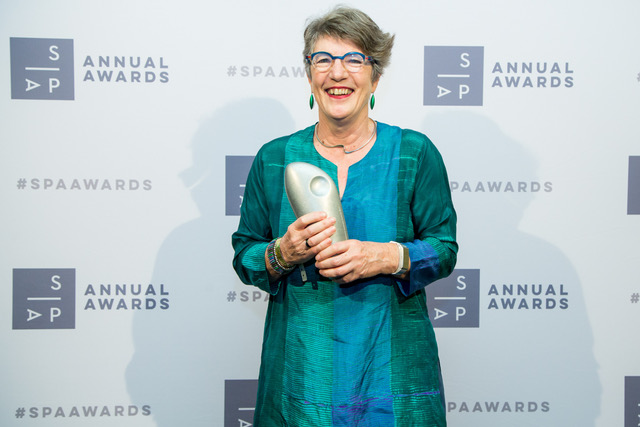Anni Browning accepts the 2017 SPA Award to Film Finances for Best Service and Facilities.
In 22 years with Film Finances Australasia, Anni Browning experienced numerous highs and faced a few challenges as the cinema industry ebbed and flowed.
Browning, who has stepped down as MD of the completion bond company but is still a consultant, supported Rachel Perkins’ debut feature Radiance.
She took one of her biggest risks on a Rolf de Heer movie, which she counts as one of her proudest achievements.
The biggest trend during her time has been the proliferation of low budget films, despite the need to pay crews and allocate reasonable money for post- production. Film Finances bonded a lot of films budgeted at $1 million- $1.5 million and one-off feature docs costing as little as $100,000- $200,000.
One thing which has not remained constant is the insurance bond premium. When she started it was as high as 6 per cent of the budget. Now it is 2.5 per cent or less.
Among the films she remembers most fondly is Radiance, Perkins’ first feature produced by Ned Lander and scripted by Louis Nowra, which was released in 1998. Almost all the crew, including DOP Warwick Thornton, were new to their roles and the drama marked the screen debuts of Deborah Mailman and Trisha Morton-Thomas.
“It was an amazing experience for me,” she says. “I was so nervous as it was one of the first films I was responsible for. Everything about it rang alarm bells but I took a bit of a leap of faith and they proved me right: they made such a beautiful film.”
The firm’s longest standing client is Anthony I Ginnane, starting with the David Hemmings-directed horror/mystery The Survivor in 1981.
She looks forward to seeing the producer’s latest film, Never Too Late (formerly The Chain Breakers), a comedy-drama about four heroic Vietnam veterans who plan to break out of their nursing home, starring Jack Thompson, James Cromwell, Dennis Waterman and Roy Billing, together with Jacki Weaver.
She has known the director Mark Lamprell since they worked on George Miller and George Ogilvie’s Mad Max Beyond Thunderdome; she was the art director and he shot a video on the making the movie.
Anni Browning with Rolf de Heer on the ‘Ten Canoes’ set.
The shortest, simplest pitch she ever received was from de Heer, who wanted her to bond Ten Canoes. He gave her the outline, told her David Gulpilil was attached and handed her a pile of photographs of 10 canoeists traversing the Arafura Swamp, taken by anthropologist Donald Thomson in 1936.
Browning, who had supported the director’s previous films The Tracker and Alexandra’s Project, recalls: “We just had to do this. It was going to be one of those movies that we will all be proud of being a part of.”
One constant during her Film Finances career was the proportion of rookie feature film producers who don’t know how to prepare sensible budgets.
“There are always new people coming into the industry, which is a great thing but it’s also the greatest challenge for us,” she says.
“We have had to virtually redo the budget for some producers because it is not realistic or bears no relationship to the norm. You have to guide people who haven’t done it before. For those who have, it is much easier.”
On roughly 5 per cent of the features bonded by Film Finances during her tenure the company was forced to cough up money when budgets ran over. She credits that relatively low rate to producers taking more and more responsibility, particularly on government-funded features.
“No one wants to blot their copybooks so they go to enormous lengths to sort out financial problems,” she observes.
She worked in the art department on numerous films, including Donald Crombie’s The Irishman, Bruce Beresford’s Money Movers and Peter Weir’s The Plumber, Gallipoli and The Year of Living Dangerously, until Sue Milliken asked her to join Film Finances.
Her departure, handing over to CEO Dan Read, prompted a flood of compliments and gratitude on social media. A selection:
Richard Keddie: “You sure will be missed Anni. A career of amazing highlights, trust and decency.”
Rosemary Blight: “You are a powerhouse of talent and support, thank you.”
Alex Sangston: “You’re a legend, and it’s been a pleasure working with you over the years. Congrats on a great run at Film Finances.”
Louise Wadley: “Thanks for everything Anni. Hope you have a fabulous time not thinking about all those films and their finances.”
A founding member of Dame Changer, she continues as a member of its advisory board. “Screen Australia is doing great work with Gender Matters and so is the Natalie Miller Fellowship but we found no one was concentrating on mid-career women, which is where we slotted in,” she says.
·



